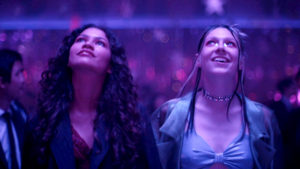I’m starting to think that the way I process film is fundamentally different than the way most critics do. This happened very recently with Another Round but it seems to happen with such regularity that a one star review is very rarely a deterrent for me when it comes to forming an opinion. Malcom & Marie never received as low a rating as that, but the reviews haven’t been particularly kind. Now after watching, I can’t for the life of me figure out what it is that critics didn’t like.
I know what the criticisms were — I have one of the reviews open in front of me now. One review says the film was too long, that it stopped being interesting after the twenty minute mark. I wasn’t bored for even a second of this movie, but I suppose this is all subjective. A couple criticize Zendaya and John David Washington‘s acting, which is particularly difficult for me to wrap my head around, since these two performances were so believable that I found myself experiencing the despondency and frustration and love of these characters right alongside them.
Most of the negative reviews ironically complained about Malcom’s, and thus director Sam Levinson‘s, hatred of critics. I don’t care about that. A great deal of this movie is one of those movies where people who make movies talk about movies, and I can’t understand a word they are saying. I enjoy film, I enjoy watching film and that is the extent of it, when people talk about things like steady cams or lighting, I zone out.
The reason why I loved this film the way I did was because it depicts an absolutely real argument between two people who despite it all truly love each other. The film begins with a score of ambient resentment, clear beneath the celebratory mood that Malcom is enjoying. His movie premiere was successful but he forgot to thank his girlfriend Marie during his speech. And that’s just the tip of the iceberg.
Marie reasons that she isn’t upset, Malcom pushes until she can’t hold back anymore. He spits vitriol at her, she accuses him of being needy. And around and around they go. It’s a circular argument in some ways. Marie says early in the film that “nothing productive will be said tonight.” And isn’t that just how arguments are sometimes with your partner? The scars go so deep that a night’s argument is not going to be the thing to make it all ok. But you can’t help yourself. “Gloves off,” Malcom says as he taunts Marie with her past mental health scare. It’s easy to see Malcom as the bad guy in this film because when Marie isn’t steady as a statue, she’s a crying, pained mess. But at the same time, it is often Marie who simply can’t let it go. There is so much wrong that is hurting her so deeply that she just needs to talk about it and even when you find yourself silently begging them to just stop maiming each other, the two can’t seem to cut it out.
It’s easy to view the relationship through a lens of toxicity. But if we’re being honest with ourselves, the pain we cause someone we dislike is so much less than the pain we are willing to inflict on those we love. They show us the most vulnerable pieces of themselves and we cherish them, cradle them like delicate glass. And when they dare to hurt us, we shatter them as ruthlessly as possible. You can only truly hate the one you love after all.
I don’t think that the majority of critics view Malcom & Marie as a two handed relationship study. And that’s a problem, because it means that they are viewing it in a much more cynical lens and are therefore taking the bait that Levinson so obviously laid out for them. Levinson distrusts critics and so critics dislike Levinson. And that’s a shame, because beyond that resentment lies a truly poignant and human film. Beneath the stage lights and the direction and the decision to color the film in black and white, there is an important story begging to be told. And it’s stories like these that make movies great.









